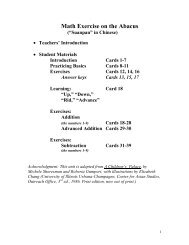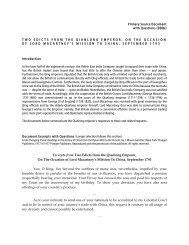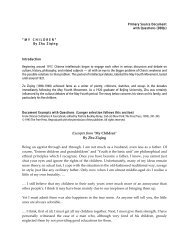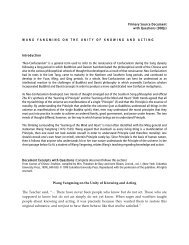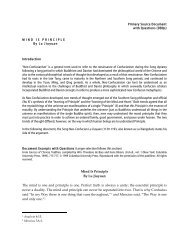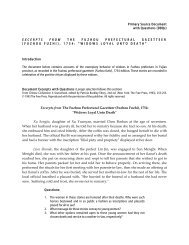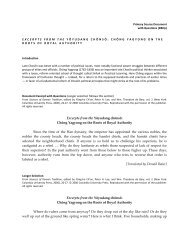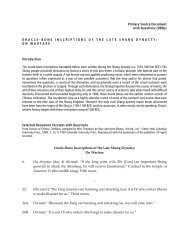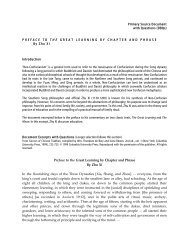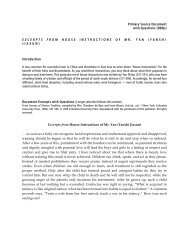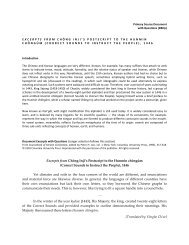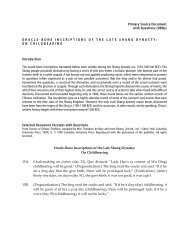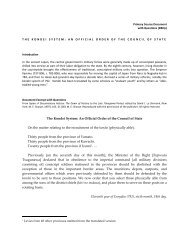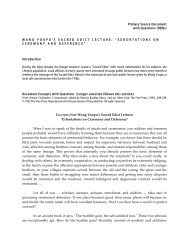EXCERPTS FROM THE GREAT LEARNING FOR WOMEN - Asia for ...
EXCERPTS FROM THE GREAT LEARNING FOR WOMEN - Asia for ...
EXCERPTS FROM THE GREAT LEARNING FOR WOMEN - Asia for ...
You also want an ePaper? Increase the reach of your titles
YUMPU automatically turns print PDFs into web optimized ePapers that Google loves.
Primary Source Documentwith Questions (DBQs)E X C E R P T S F R O M <strong>THE</strong> <strong>GREAT</strong> <strong>LEARNING</strong> <strong>FOR</strong> <strong>WOMEN</strong> (ONNADAIGAKU)by Kaibara EkkenIntroductionKaibara Ekken (1630-1714) was a neo-Confucian scholar and naturalist who served the Kuroda lords of Fukuokadomain on the southern island of Kyushu. Ekken was committed to popularizing Confucian ethics and was wellknown<strong>for</strong> his accessible self-help guides — down-to-earth manuals of behavior written in vernacular Japaneserather than in difficult scholarly language. Ekken’s treatises included volumes delineating proper conduct <strong>for</strong> lords,warriors, children, families, and, perhaps most famously, women. In Onna daigaku (The Great Learning <strong>for</strong> Women)Ekken promotes a strict code of behavior <strong>for</strong> mothers, wives, and daughters very much in harmony with the neo-Confucian intellectual orthodoxy of Tokugawa Japan.Selected Document Excerpts with QuestionsFrom Sources of Japanese Tradition, edited by Wm. Theodore de Bary, Carol Gluck, and Arthur L. Tiedemann, 2nd ed., vol. 2 (NewYork: Columbia University Press, 2005), 263-271. © 2005 Columbia University Press. Reproduced with the permission of thepublisher. All rights reserved.ExcerptsfromTheGreatLearning<strong>for</strong>Women(OnnaDaigaku)byKaibaraEkken…It is the duty of a girl living in her parents’ house to practice filial piety toward herfatherandmother.Butaftermarriage,herdutyistohonorherfather‐in‐lawandmother‐in‐law,tohonorthembeyondherfatherandmother,toloveandreverencethemwithallardor,andtotend them with a practice of filial piety. While thou honorest thine own parents, think notlightlyofthyfather‐in‐law!Nevershouldawomanfail,nightandmorning,topayherrespectsto her father‐in‐law and mother‐in‐law. Never should she be remiss in per<strong>for</strong>ming any tasksthey may require of her. With all reverence she must carry out, and never rebel against, herfather‐in‐law’scommands.Oneverypointmustsheinquireofherfather‐in‐lawandmother‐inlawandaccommodateherselftotheirdirection.Evenifthyfather‐in‐lawandmother‐in‐lawaredisposed to hate and vilify thee, do not be angry with them, and murmur not. If thou carrypietytowardthemtoitsutmostlimitsandministertotheminallsincerity,itcannotbebutthattheywillendbybecomingfriendlytothee.Awomanhasnootherlord;shemustlooktoherhusbandasherlordandmustservehimwithallworshipandreverence,notdespisingorthinkinglightlyofhim.TheWayofthewoman is to obey her man. In her dealings with her husband, both the expression of hercountenanceandthestyleofheraddressshouldbecourteous,humble,andconciliatory,never
Primary Source Document with Questions (DBQs) on<strong>EXCERPTS</strong> <strong>FROM</strong> <strong>THE</strong> <strong>GREAT</strong> <strong>LEARNING</strong> <strong>FOR</strong> <strong>WOMEN</strong> (ONNA DAIGAKU), BY KAIBARA EKKENpeevish and intractable, never rude and arrogant — that should be a woman’s first andprincipalcare.Whenthehusbandissueshisinstructions,thewifemustneverdisobeythem.Indoubtfulcasessheshouldinquireofherhusbandandobedientlyfollowhiscommands.Ifherhusbandeverasksheraquestion,sheshouldanswertothepoint;toanswercarelesslywouldbeamarkofrudeness.Ifherhusbandbecomesangryatanytime,shemustobeyhimwithfearand trembling and not oppose him in anger and <strong>for</strong>wardness. A woman should look on herhusbandasifhewereHeavenitselfandneverwearyofthinkinghowshemayyieldtohimandthusescapecelestialcastigation.…Awomanmustalwaysbeonthealertandkeepastrictwatchoverherownconduct.Inthemorningshemustriseearlyandatnightgolatetorest.Insteadofsleepinginthemiddleoftheday,shemustbeintentonthedutiesofherhousehold;shemustnotgrowtiredofweaving,sewing,andspinning.Shemustnotdrinktoomuchteaandwine,normustshefeedhereyesandearsontheatricalper<strong>for</strong>mances(kabuki,jōruri),ditties,andballads.……Inhercapacityasawife,shemustkeepherhusband’shouseholdinproperorder.Ifthewifeisevilandprofligate,thehousewillberuined.Ineverythingshemustavoidextravagance,andinregardtobothfoodandclothes,shemustactaccordingtoherstationinlifeandnevergiveintoluxuryandpride.…Thefiveworstinfirmitiesthatafflictwomenareindocility,discontent,slander,jealousy,andsilliness.Withoutanydoubt,thesefiveinfirmitiesarefoundinsevenoreightofeverytenwomen, and it is they that cause women to be inferior to men. A woman should counteractthemwithself‐inspectionandselfreproach.Theworstofthemallandtheparentoftheotherfourissilliness.Awoman’snatureispassive(yin).Theyinnaturecomesfromthedarknessofnight. Hence, as viewed from the standard of a man’s nature, a woman’s foolishness [meansthat she] fails to understand the duties that lie be<strong>for</strong>e her very eyes, does not recognize theactionsthatwillbringblameonherownhead,anddoesnotcomprehendeventhosethingsthatwillbringcalamitytoherhusbandandchildren.Norwhensheblamesandaccusesandcursesinnocentpersonsorwhen,inherjealousyofothers,shethinksonlyofherself,doessheseethatsheisherownenemy,alienatingothersandincurringtheirhatred.Lamentableerrors.Again,inthe education of her children, her blind affection induces an erroneous system. Such is thestupidityofhercharacterthatitisincumbentonher,ineverydetail,todistrustherselfandobeyherhusband.[“Onnadaigaku,”inNST,vol.34,pp.202–5;trans.adaptedandrevisedfromChamberlain,“EducationalLiteratureofJapaneseWomen,”pp.325‐43;WTdB]Questions:1. What values does the author of this piece feel are most important <strong>for</strong>women to cultivate?<strong>Asia</strong> <strong>for</strong> Educators l Columbia University l http://afe.easia.columbia.edu Page 2 of 3
Primary Source Document with Questions (DBQs) on<strong>EXCERPTS</strong> <strong>FROM</strong> <strong>THE</strong> <strong>GREAT</strong> <strong>LEARNING</strong> <strong>FOR</strong> <strong>WOMEN</strong> (ONNA DAIGAKU), BY KAIBARA EKKEN2. Do you think Ekken advocated education <strong>for</strong> women? Why or why not?3. What does Ekken mean by “silliness” in this passage?4. Do you think most women in Tokugawa Japan followed codes of conductlike those outlined here?<strong>Asia</strong> <strong>for</strong> Educators l Columbia University l http://afe.easia.columbia.edu Page 3 of 3



